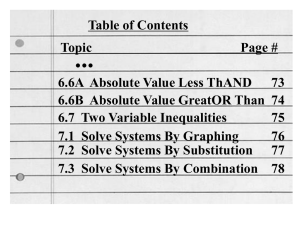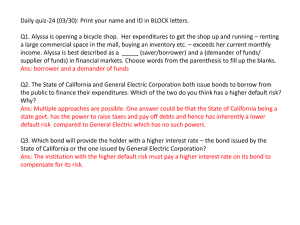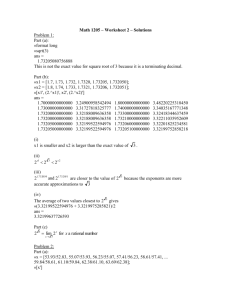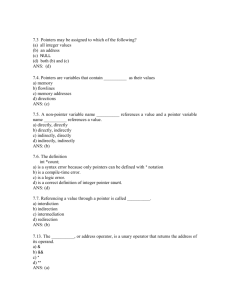Chapter 7, Managing for Ethical Conduct
advertisement
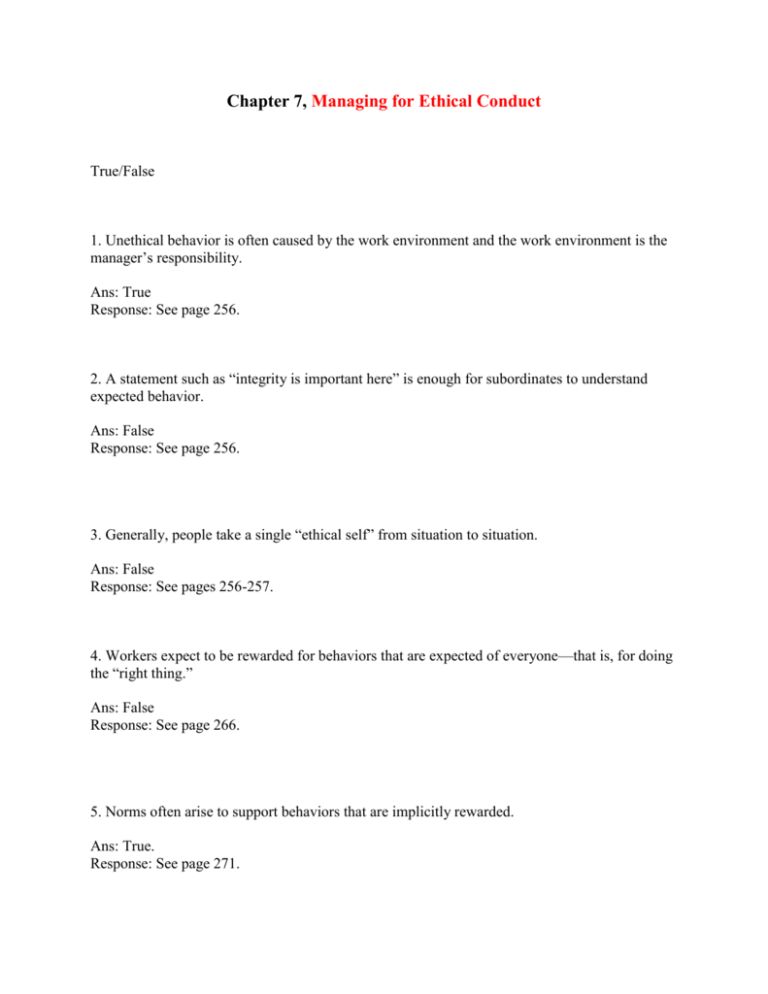
Chapter 7, Managing for Ethical Conduct True/False 1. Unethical behavior is often caused by the work environment and the work environment is the manager’s responsibility. Ans: True Response: See page 256. 2. A statement such as “integrity is important here” is enough for subordinates to understand expected behavior. Ans: False Response: See page 256. 3. Generally, people take a single “ethical self” from situation to situation. Ans: False Response: See pages 256-257. 4. Workers expect to be rewarded for behaviors that are expected of everyone—that is, for doing the “right thing.” Ans: False Response: See page 266. 5. Norms often arise to support behaviors that are implicitly rewarded. Ans: True. Response: See page 271. 6. Work roles can support either ethical or unethical behavior. Ans: True Response: See page 263. 7. When an employee brings up an ethical concern at work, the manager is obliged to take the issues completely off the employee’s hands. Ans: False Response: See page 283. 8. Researchers have found that employees may be less likely to report ethical problems to management if they are intently focused on achieving a task. Ans.: True Response: Page 261 9. Workers have to be personally rewarded or punished for the message to have an impact. Ans.: False Response: Page 264 10. If punishment occurs in private, few employees will know that unethical behavior was admonished; thus, managers should ensure that employees who behave unethically are punished publicly so that others learn from the process. Ans.: False Response: Page 267 11. Workers expect managers to discipline fairly, and they are morally outraged when management doesn’t do its job. Ans.: True Response: Page 270 12. Roles can support ethical behavior thus it makes sense to include in a Code of Conduct a statement that calls for employees who see misconduct to report it. Ans.: True Response: Page 275 13. People are much more likely to act ethically if they perceive themselves as personally responsible for the outcomes of their decisions and actions. Ans.: True Response: Page 283 14. A decrease in levels in the organizational hierarchy leads to better lateral communication among employees and makes it more difficult for employees to rationalize that higher-ups were responsible. Ans.: True Response: Page 284 Matching Reference: Matching Key Terms and Definitions a) integrity b) reinforcement theory c) social learning theory d) Pygmalion effect 15. People are likely to behave in ways that are rewarded. Ans: b Response: See page 264. 16. People generally live up to the expectations that are set for them—high or low. Ans: d Response: See page 264. 17. That quality or state of being complete, whole, and undivided. Ans: a Response: See page 259. 18. People learn from observing the rewards and punishments of others. Ans: c Response: See page 264. Multiple Choice 19. Which of the following is true? a) Attempting to achieve a task goal can decrease risky behavior. b) Employees focus on what managers say more than what managers do. c) Employees will not search for clues about what gets rewarded; they must be told by managers that it is important. d) Meeting a goal provides psychological benefits. Ans: d Response: See page 261. 20. The Tailhook scandal is an example of: a) Management focusing too much on the ends rather than the means. b) The ethical Pygmalion effect. c) Social learning theory. d) Employees ignoring management’s clear message. Ans: c Response: See pages 264-266. 21. Which of the following is true? a) Rewards set the tone for what’s expected and rewarded in the long term. b) Employees need to be rewarded for engaging in specific ethical behaviors. c) Punishment is an inherently bad practice. d) Rewards are better to control short-run ethical behavior. Ans: a Response: See page 266. 22. Which of the following is false? a) The idea that punishment should be avoided is based on research on rats and small children. b) People are less likely to engage in unethical behavior if it is likely to be detected and punished. c) Other employees are affected by the punishment of just one employee. d) People do not care if violators of ethical conduct are punished. Ans: d Response: See page 268. 23. Group norms can cause an “everyone is doing it” mentality. This means: a) People are more likely to recognize issues as “ethical issues." b) Many individuals will go along with unethical behavior because of a strong need for peer acceptance. c) Managers cannot blame individual employees for unethical behavior. d) Employees are actively disengaged in groups. Ans: b Response: See page 271. 24. Which of the following is false? a) People enter organizations in a state of “role readiness.” b) Roles reduce a person’s sense of individuality. c) Managers do not have roles as much as their subordinates do. d) Conflicting role expectations can cause increased incidences of lying. Ans: c Response: See page 272. 25. The __________ experiment demonstrated how normal students accepted and acted on their randomly assigned role of prisoner or guard. a) Milgram b) Manville c) Zimbardo d) My Lai Ans: c Response: See pages 273-274. 26. The ___________ experiment demonstrated the power of legitimate authority. Teachers were unwilling to question the experimenter’s authority for fear of personal embarrassment or upsetting the status quo. a) Milgram b) Manville c) Zimbardo d) My Lai Ans: a Response: See pages 277-278. 27. The Zimbardo experiment provides insight into ___________ just as the Milgram experiment provides insight into ____________. a) My Lai massacre; Abu Ghraib prison scandal b) Watergate scandal; My Lai massacre c) Abu Ghraib prison scandal; My Lai massacre d) My Lai massacre; Watergate scandal Ans: c Response: See pages 273-274. Difficulty: Difficult 28. Groupthink occurs when: a) A group is working together in a cohesive, flowing manner for peak performance. b) Group members know each other so well that they are able to anticipate each other’s ideas. c) Group members conform to the group’s decision and are unwilling to express disagreement. d) A group cannot make a decision because members are unwilling to compromise. Ans: c Response: See page 280. Short Answer 29. You are a manager in an electronics department that sells TVs. Corporate headquarters has provided a new incentive to salespeople—they will receive higher commissions when they sell higher priced TV models. What should you do in order to maintain high ethical integrity in your department? Ans: Students should discuss the importance of communicating that how a goal is achieved is just as important as achieving the goal itself. The manager needs to let his or her workers know that the organization cares about how the TVs are sold; he or she may also provide information on the best way to sell the TVs. Response: See pages 262-263. Difficulty: Difficult 30. As a manager, you are faced with the particularly daunting task of disciplining an employee. You remember that punishment must be “fair.” Briefly describe what is expected of you in order for the punishment is to be seen as “fair.” Ans: Students should recognize that fairness has two components: (1) the punishment fits the crime and (2) punishment is consistent across employees. Response: See pages 267-270. Difficulty: Difficult 31. Briefly describe four ways in which diffusion of responsibility occurs in an organization. Ans: Students should describe some variation of the following: (1) the manager tells the employee to “don’t worry”; (2) decisions are made in a group; (3) individuals are just a “cog” in a machine and can’t see the “big picture”; and (4) psychological distance from the victim Response: See pages 280-283.

